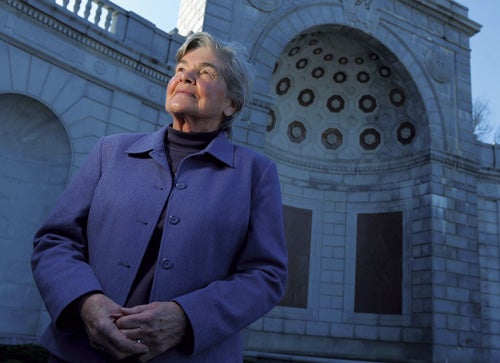Salute to Eleanor Porter

A veteran of healing and inspiration for wounded soldiers.
After Eleanor Johnson Porter ’51 earned her biology degree, she became a lab technician for the City of Providence, testing water at the Scituate Reservoir’s Treatment Facility near her family’s home.
“I quickly realized that I wanted to work with people instead of test tubes,” she says. That decision changed the direction of her life and the lives of many wounded soldiers from the Korean, Iraq, and Afghanistan wars. In fact, Eleanor married one of those soldiers.
The 82-year-old Springfield, Va., resident was one of a dozen female veterans honored last spring by the Department of Defense 60th Anniversary of the Korean War Commemoration Committee. The Washington Post prominently featured her in an article at that time.
Eleanor joined the Women’s Medical Specialist Corps in 1952; just five months later, the Army 2nd lieutenant was stationed at Brooke Army Medical Hospital at Fort Sam Houston helping soldiers returning from the Korean War with burns, lost limbs, and traumatic head injuries.
“You can’t show emotion,” she says. “Patients need someone they can depend on. Some had lost eyes, multiple limbs, had horrific burns. You have to be strong for them. You have to say to yourself: If they can stand it, so can I. Tears ran down my cheeks when I was working with Joey, a little boy with polio who was a dependent. He cried so hard when I had to stretch his muscles. The head physical therapist saw my tears and called me on it.”
Eleanor found that soldiers who had lost limbs developed a special camaraderie and used humor to cope. One of them caught her eye. Lt. Tom Porter, 22 at the time, had lost both his legs in July 1952 when he led a patrol into enemy territory and ended up in a minefield. Eleanor and Tom met at Brooke in January 1953.
“He was a nice-looking young man, but so fresh,” Eleanor says with a laugh. “He always made sure that I was his physical therapist. When I was bandaging his leg, he’d always try to grab my hand and hold it. I told him that he would get me in trouble.”
After Tom went home to Oklahoma, Eleanor was transferred, providing physical therapy at Camp Carson in Colorado Springs, where Tom would visit her every month. Between visits the couple would talk frequently on the phone.
Eleanor brought Tom home to Rhode Island for Christmas to meet her family. Her parents were worried. “How are you going to make a living?” she recalls them asking. “Worries aside, my family was smitten with him.” The couple married in March 1954.
Her parents needn’t have been concerned. The couple first moved to Oklahoma. In 1956, Tom joined the U.S. Department of Agriculture and eventually became a charter member of the Senior Executive Service and director of its Livestock, Meat, Grain, and Seed Division in the nation’s capitol. The Porters have four children and 11 grandchildren.
Eleanor, whose brothers Charles Johnson ’51 and Arnold Johnson ’53 and sister-in-law Joan Gaddes Johnson ’54 also attended URI, recalls returning to Kingston for her 50th Class Reunion. “One of my Sigma Kappa sorority sisters pulled me aside after she saw Tom walk in and asked if I had a different husband,” she says with a chuckle. The woman could not believe Tom was a double amputee.
Back to the Present
Seven-and-a-half years ago, the Porters, inspired by a newspaper article, realized their experiences could help soldiers who lost limbs in the Iraq and Afghanistan wars. They joined the Amputee Coalition of America and began visiting patients at the Walter Reed Army Medical Center in Washington, D.C., (which is now closed).
“The patients are amazed when they see Tom because he walks so well. You would never know he lost both legs. When they find out he is a double amputee, it gives them hope. They see that life goes on. They figured if that old geezer can do it, so can I.”
One of the parishioners at the Porters’ church suggested making cookies for the patients. Two additional churches joined in the effort. Soon Eleanor was bringing 30 dozen homemade cookies to the patients each week.
One amputee’s mother gave Eleanor an L.L. Bean bag with cookies written on it. “From then on, I was known as the cookie lady. They loved the homemade cookies. They even put in orders. One only wanted oatmeal raisin. Another wanted some fudge. ‘Remember, Todd loves fudge,’ he would call out.” Todd is a quadruple amputee.
One patient, Micha, a soldier from the Democratic Republic of Georgia who had lost a leg, spoke little English and stayed by himself. “One day, I caught him looking at my cookie bag, so I offered him a small bag. He had a sweet tooth,” she laughs. “After that, we became good friends.”
So far, the Porters have visited more than 1,000 amputees. They now visit patients at the new Walter Reed National Military Medical Center in Bethesda, Md., about twice a month. “We’re getting older and it’s more difficult getting there and parking,” she says.
They have been invited to weddings—Tom served as a groomsman for another double amputee—had children named after them, and became the godparents for a Marine amputee. The couple has been mentioned in two books: One Step at a Time and Standing Tall.
“We hear from a lot of the patients who have become dear friends, especially around the holidays. When The Washington Post came out, we heard from so many former patients from all across the country. And we have baby pictures. Lots and lots of baby pictures,” says Eleanor. “Whenever we are informed of a birth, I usually knit a sweater and send it off. It’s been so rewarding.”
By Jan Wenzel ‘87
 Home
Home Browse
Browse Close
Close Events
Events Maps
Maps Email
Email Brightspace
Brightspace eCampus
eCampus


